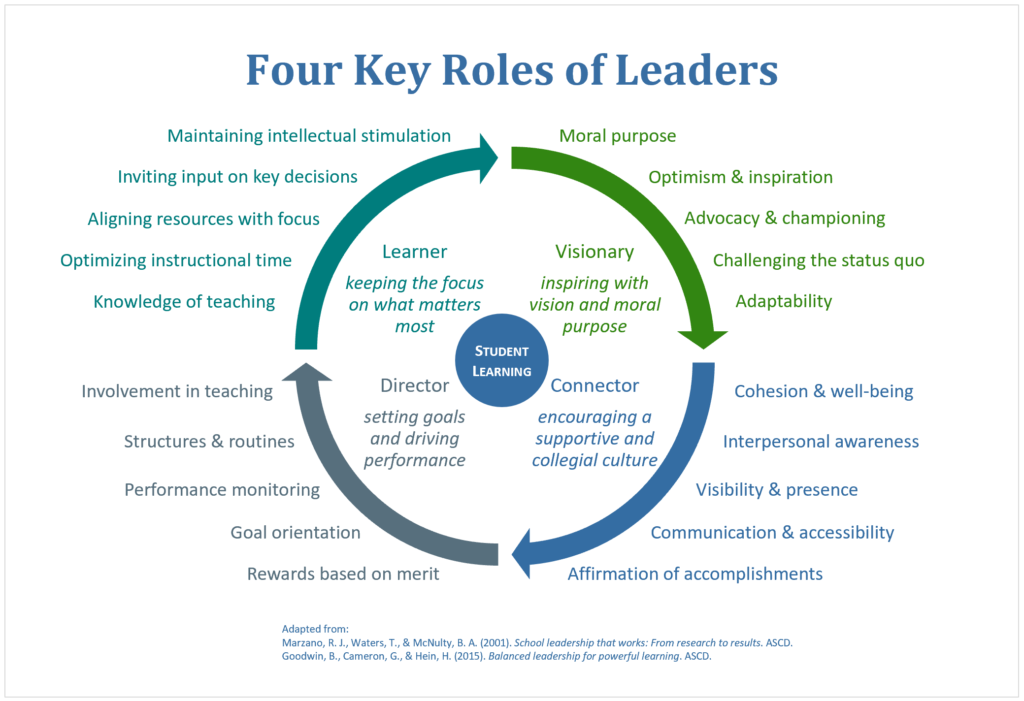This past August, in response to the rapidly changing context of delivering education during COVID-19, Region 12 Comprehensive Center launched a monthly forum to engage Kansas school superintendents in conversations about leading change in times of uncertainty. Facilitated by Bryan Goodwin, CEO of McREL International, and Bill Slotnik, CEO of the Community Training and Assistance Center, these hour-long Zoom sessions are centered on four key roles of leaders as Visionary, Connector, Director, and Learner (Goodwin et al., 2015; Marzano et al., 2001). By connecting research to application, the forums promote reflection on professional practice to develop solutions to complex education problems. 
Designed as both professional and peer learning, each session begins with a plenary discussion centered on one or more roles and related practices of successful leaders. For example, in a recent session the role of Visionary leader was explored with a focus on practicing how to adapt to new and evolving circumstances. To think through overcoming challenges to achieve desired results, school leaders engaged in scenario planning focused on identifying their schools’ bright spots as catalysts for positive change.
In small breakout group discussions, guiding questions are posed that allow participants to reflect on their leadership practice while thinking forward toward innovation. During these small group conversations, each participant has the opportunity to share what is working in their district and how they are thinking about the future. After small group discussions, a closing plenary session asks superintendents to think about how they will take what they have learned back to their district to affect positive change.
“The Executive Leadership Forum sessions have provided me an opportunity to disconnect from the daily challenges leaders are facing and reconnect with our core purpose.” Said Cory Gibson, Superintendent of Valley Center USD 262. “The balance of new learning and opportunities to reflect and connect with others is invaluable. In many cases, I was able to immediately apply what I had learned and share it with our leadership team.”
From its inception, a major goal of the Executive Leadership Forum has been to focus superintendents on how they can accelerate the improvement of instructional practice in the rapidly changing, challenging, and complex context of COVID-19. The forums have covered key best practices such as identifying bright spots and pockets of success that can be strengthened and replicated, fostering social and emotional learning through asset-based thinking, and avoiding quick fixes to focus on addressing the adaptive challenges presented by the pandemic to innovate and improve student learning and outcomes. Sessions build upon each other to address the emerging issues school leaders are facing.
The Executive Leadership Forums have been so well-received that R12CC has initiated several new sessions. In Kansas, beginning in January of this year, a partnership with United School Administrators–Kansas has allowed the forums to expand and provide this leadership capacity building support to elementary principals and secondary principals across the state. In Missouri, the Executive Leadership Forum was initiated in February to support a group of leading superintendents in identifying and sharing their bright spots, while building their capacity to continue to innovate and accelerate student learning in Missouri.
The forums will continue to promote the use of evidence-based practices, while building a peer network that gives space for leaders to learn how others are applying these practices in their own school and community contexts. Focusing on the key roles of leaders will continue to set the tone, with emphasis on supporting leaders as they make critical decisions for accelerating learning and continuing safe operations in the changing context of the coronavirus pandemic.
References
Goodwin, B., Cameron, G., & Hein, H. (2015). Balanced leadership for powerful learning. ASCD.
Marzano, R. J., Waters, T., & McNulty, B. A. (2001). School leadership that works: From research to results. ASCD.
